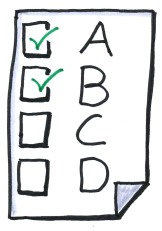In January 2017, CTE interviewed Pamela Spigelmyer, Faculty, School of Nursing about her use of exam wrappers to help students learn. 
What is an exam wrapper?
It’s a reflection by students on their exam performance. It stimulates them to think about the effort they put into studying for the exam, and the barriers to achieving their best score. I ask students to do the following:
- tell how much time they studied and estimate the percentage of time they spent on various study methods
- analyze the reason for the points they lost on the exam
- state their study plans
- suggest ways I can support them for the next exam. [see sample wrapper below]
Tell me how you have used exam wrappers.
I have used them on the midterm exam in three different courses. Students can use their reflection on the midterm to improve their learning in the second half of the semester.
In my freshmen class this fall it went really well. I was surprised at the list of things they said they were going to do to improve for the next exam. When I asked, “what can I do to help you,” there were only minor comments. This makes sense, because I was already administering frequent quizzes and giving them clicker questions in class. They were getting practice.
What have you learned in the process?
Some of the comments I got back really opened my eyes to what students thought was effective study. For example, some students created 50-60 page study guides by cutting and pasting from the book. They explained that this guide was all they used for studying and claimed that it should have been enough. But they didn’t do well, and I was able to provide that as evidence back to them.
I put student grades into two ranges and made a chart of the study methods students in each range said they used. Then I presented it saying, “if you want to achieve a higher grade, here’s an idea of what some of your classmates did.” 
Once I had a student who honestly reported on the exam wrapper that she had studied zero time. She had not looked at any material in preparing for the midterm exam. She apparently didn’t implement the study methods we talked about after the midterm, and performed poorly on the final exam. Then, at the end of the course, she challenged the grade. The exam wrapper served as evidence that she hadn’t put in the effort needed to achieve a better grade.
Do you have a way for students to refer back to their reflection? How do you administer the exam wrapper?
They always have the wrapper available on Blackboard. Right after the midterm exam closes, the exam wrapper assignment opens up. I tell them it is not graded, but it is required. Most students complete the 10-15 minute reflection within the 24-hour window.
Here’s the sequence: students take the online exam, receive the score immediately and then are asked to reflect on the exam and their studying. 
I tell students that I use exam wrappers to identify areas where I can help them improve, and that they should use it for looking at their learning and areas for growth.
How have you used exam wrappers to help students?
Several students have mentioned stress anxiety. This gives me an opportunity to guide students to the Counseling and Wellness Center. In the past, they could have struggled without me knowing, but now I can pick that up at midterm.
Here’s another example. I can see from exam statistics where students get it down to two answers and can’t pick the right one; this is very typical for nursing exams. That tells me that I need to be more explicit in helping them choose between the two. There’s always something in one that makes it better than the other, and they’re just overlooking it. So we do practice questions that are specifically close in two answers.
another example. I can see from exam statistics where students get it down to two answers and can’t pick the right one; this is very typical for nursing exams. That tells me that I need to be more explicit in helping them choose between the two. There’s always something in one that makes it better than the other, and they’re just overlooking it. So we do practice questions that are specifically close in two answers.
Sometimes they say, “I just didn’t know the content,” which suggests that they didn’t prepare enough and I outline the way high achieving students study.
Before the exam, I also provide a study template. It just lists the course objectives and tells how many exam questions will be related to each objective. It shows the importance of sections. When there is a lot of material, it’s only fair for students to know how to prioritize their studying.
I like that way of tying it to the course learning objectives.
I also do frequent quizzing – which helps them gauge their learning. I don’t give them answers for items they miss, but just indicate the reading chapter it came from. That forces them to go back and find it.
Do you have any suggestions for your colleagues? Is anyone else doing it that you know of?
Several faculty colleagues have asked me for this assignment, and they have started to implement it. Others use a similar kind of method that they have created.
Do you tie this assignment in with a nursing competency?
I haven’t, but that would be a good idea. I never thought of that. It would fit under “professionalism and growth.”
Related posts: Helping Students Learn from Returned Tests The Finals Lap: Tips and Ideas for Final Exam Review
SAMPLE EXAM WRAPPER
- Approximately how much time did you spend preparing for this exam?
- What percentage of your test-preparation time was spent in each of these activities?
| Activity | Percentage of Time |
| Reading textbook section(s) for the first time | |
| Rereading textbook section(s) | |
| Reviewing homework-quiz question/concepts | |
| Reviewing in-class practice questions | |
| Solving case study questions from textbook | |
| Reviewing your own notes | |
| Reviewing additional materials/websites posted in class weekly folders | |
| Other: (please specify) |
3. Now that you have looked over your graded exam, estimate the percentage of points you lost due to each of the following (make sure the percentages add up to 100):
| Reason for lost exam points | Percentage |
| Did not know/remember the content on the exam | |
| Did not understand the question | |
| Did not read the question/item carefully | |
| Missed key words in the question | |
| Did not read all distractor /potential answers carefully | |
| Had difficulty choosing between 2 answers | |
| Read/inferred more into the question than what was stated | |
| Careless mistake (selected the wrong response accidentally) | |
| Changed the answer | |
| Experienced test anxiety/ inability to focus | |
| Other: (please specify) |
4. Based on your responses to the questions above, name at least three things you plan to do differently in preparing for the next exam. For instance, will you just spend more time studying, change a specific study habit or try a new one (if so, name it), solve more case studies, practice more questions, or something else?
5. What can I do to help support your learning and your preparation for the next exam?


Thanks Pam – the timing for this post was perfect. I read it on Monday just prior to handing back exams on Tuesday. Because it was too late to ask students to do the same reflection online, I adapted your strategy as a brief in-class reflection and then I am using some of your prompts for students who ask to meet with me to review their exam performance. Thanks for your insightful post!
LikeLike
There should be some serious reflection of study habits. The blog is quite informative where the low performing students and high performing students have been compared in a chart.
LikeLike
Pam, I’m still referring people to this post!
LikeLike